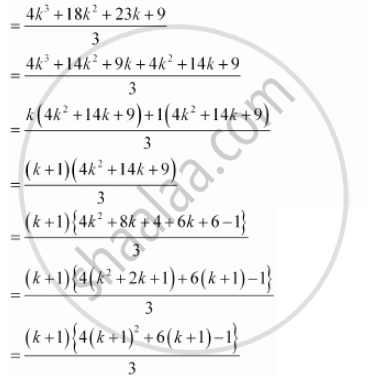Advertisements
Advertisements
Question
Prove the following by using the principle of mathematical induction for all n ∈ N:
Solution
Let the given statement be P(n), i.e.,


Thus, P(k + 1) is true whenever P(k) is true.
Hence, by the principle of mathematical induction, statement P(n) is true for all natural numbers i.e., n.
APPEARS IN
RELATED QUESTIONS
Prove the following by using the principle of mathematical induction for all n ∈ N: 1.2.3 + 2.3.4 + … + n(n + 1) (n + 2) = `(n(n+1)(n+2)(n+3))/(4(n+3))`
Prove the following by using the principle of mathematical induction for all n ∈ N:
Prove the following by using the principle of mathematical induction for all n ∈ N:
Prove the following by using the principle of mathematical induction for all n ∈ N:
`1/1.4 + 1/4.7 + 1/7.10 + ... + 1/((3n - 2)(3n + 1)) = n/((3n + 1))`
Prove the following by using the principle of mathematical induction for all n ∈ N:
Prove the following by using the principle of mathematical induction for all n ∈ N: 32n + 2 – 8n– 9 is divisible by 8.
Prove the following by using the principle of mathematical induction for all n ∈ N: 41n – 14n is a multiple of 27.
If P (n) is the statement "n(n + 1) is even", then what is P(3)?
If P (n) is the statement "2n ≥ 3n" and if P (r) is true, prove that P (r + 1) is true.
If P (n) is the statement "n2 − n + 41 is prime", prove that P (1), P (2) and P (3) are true. Prove also that P (41) is not true.
Give an example of a statement P(n) which is true for all n ≥ 4 but P(1), P(2) and P(3) are not true. Justify your answer.
1 + 3 + 5 + ... + (2n − 1) = n2 i.e., the sum of first n odd natural numbers is n2.
\[\frac{1}{3 . 5} + \frac{1}{5 . 7} + \frac{1}{7 . 9} + . . . + \frac{1}{(2n + 1)(2n + 3)} = \frac{n}{3(2n + 3)}\]
\[\frac{1}{3 . 7} + \frac{1}{7 . 11} + \frac{1}{11 . 5} + . . . + \frac{1}{(4n - 1)(4n + 3)} = \frac{n}{3(4n + 3)}\]
\[\frac{1}{2} + \frac{1}{4} + \frac{1}{8} + . . . + \frac{1}{2^n} = 1 - \frac{1}{2^n}\]
12 + 32 + 52 + ... + (2n − 1)2 = \[\frac{1}{3}n(4 n^2 - 1)\]
52n+2 −24n −25 is divisible by 576 for all n ∈ N.
32n+2 −8n − 9 is divisible by 8 for all n ∈ N.
2.7n + 3.5n − 5 is divisible by 24 for all n ∈ N.
\[\frac{(2n)!}{2^{2n} (n! )^2} \leq \frac{1}{\sqrt{3n + 1}}\] for all n ∈ N .
\[\text { A sequence } x_1 , x_2 , x_3 , . . . \text{ is defined by letting } x_1 = 2 \text{ and } x_k = \frac{x_{k - 1}}{k} \text{ for all natural numbers } k, k \geq 2 . \text{ Show that } x_n = \frac{2}{n!} \text{ for all } n \in N .\]
Prove by method of induction, for all n ∈ N:
12 + 22 + 32 + .... + n2 = `("n"("n" + 1)(2"n" + 1))/6`
Prove by method of induction, for all n ∈ N:
(23n − 1) is divisible by 7
Prove by method of induction, for all n ∈ N:
5 + 52 + 53 + .... + 5n = `5/4(5^"n" - 1)`
Answer the following:
Prove, by method of induction, for all n ∈ N
8 + 17 + 26 + … + (9n – 1) = `"n"/2(9"n" + 7)`
Answer the following:
Prove, by method of induction, for all n ∈ N
12 + 42 + 72 + ... + (3n − 2)2 = `"n"/2 (6"n"^2 - 3"n" - 1)`
Answer the following:
Given that tn+1 = 5tn − 8, t1 = 3, prove by method of induction that tn = 5n−1 + 2
Answer the following:
Prove by method of induction loga xn = n logax, x > 0, n ∈ N
Prove statement by using the Principle of Mathematical Induction for all n ∈ N, that:
2n + 1 < 2n, for all natual numbers n ≥ 3.
Let P(n): “2n < (1 × 2 × 3 × ... × n)”. Then the smallest positive integer for which P(n) is true is ______.
A student was asked to prove a statement P(n) by induction. He proved that P(k + 1) is true whenever P(k) is true for all k > 5 ∈ N and also that P(5) is true. On the basis of this he could conclude that P(n) is true ______.
Prove the statement by using the Principle of Mathematical Induction:
n2 < 2n for all natural numbers n ≥ 5.
Prove the statement by using the Principle of Mathematical Induction:
2n < (n + 2)! for all natural number n.
Prove the statement by using the Principle of Mathematical Induction:
1 + 2 + 22 + ... + 2n = 2n+1 – 1 for all natural numbers n.
Prove that for all n ∈ N.
cos α + cos(α + β) + cos(α + 2β) + ... + cos(α + (n – 1)β) = `(cos(alpha + ((n - 1)/2)beta)sin((nbeta)/2))/(sin beta/2)`.
By using principle of mathematical induction for every natural number, (ab)n = ______.
